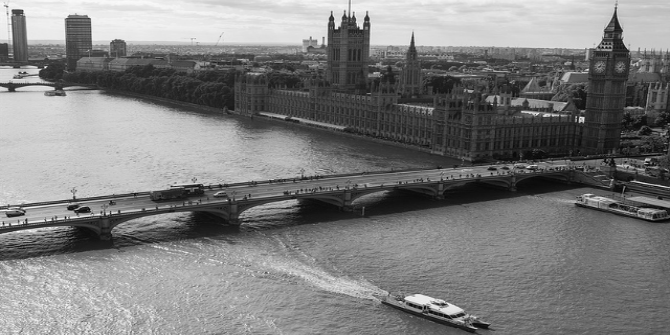 We need to be clear about Parliament’s role in decisions to take us to war – and we aren’t there yet, says Graham Allen MP, Chair of the Political and Constitutional Reform Committee in the House of Commons.
We need to be clear about Parliament’s role in decisions to take us to war – and we aren’t there yet, says Graham Allen MP, Chair of the Political and Constitutional Reform Committee in the House of Commons.
Prerogative powers are the ancient powers of the monarch, which have no basis in statute law, and which have been exercised by ministers over many years, without any need to consult Parliament. When I published my book, ‘The Last Prime Minister’, nearly ten years ago, I put at the front a quote from Tony Blair, which said everything that needed to be said about where we stood at the time:
The Prime Minister’s role as head of Her Majesty’s Government, as principal adviser and as Chairman of the Cabinet are not defined in legislation. These roles, including the exercise of power under the royal prerogative have evolved over many years drawing on convention and usage and it is not possible precisely to define them. The Government have no plans to introduce legislation in this area.
Well, some things have changed since then. At the very end of Gordon Brown’s Government, Parliament did pass legislation limiting some of the royal prerogative powers. The idea of a merit-based civil service that works for governments of different political complexions is now based in law, not just something a Prime Minister could do away with overnight. Parliament also now has a statutory role – albeit a modest one – in decisions to enter into international treaties. The current coalition Government has introduced fixed-term five-year Parliaments, and taken away from Prime Ministers the power to call – or threaten to call – a general election whenever they like.
But one area of the royal prerogative – perhaps the most important – remains untouched, and that is the power to go to war and to deploy our armed forces on operations overseas. When British forces were sent to Iraq in 2003 and deployed to Libya earlier this year, the Government didn’t have to ask Parliament’s permission or support to do so. As it happens, they did ask: but they didn’t have to. In the case of Libya, they only asked after the intervention had already begun. When I wrote a new opening to ‘The Last Prime Minister’ in the light of Iraq, I put it like this:
To all intents and purposes, a Prime Minister has the same power over our forces as Henry V, although without the same obligation to lead them in person. Nearly six centuries after Agincourt, Parliament still has no formal or agreed role in the decision to go to war or the conduct and purpose of a war.

Much was said after Iraq. Two committees published reports. The government published a green paper, a white paper and a draft parliamentary resolution – scrutinised by yet another committee. But nothing actually happened. There was no law, no resolution, nothing agreed by Parliament. Libya was the spur for my committee to look again at Parliament’s role in decisions to go to war.
The Political and Constitutional Reform Committee was set up at the beginning of this Parliament in response to the new Government’s far-reaching programme of reform. But what we do is up to us, and we have an agenda which takes us where we choose. I was elected to chair the committee by Members of Parliament from across the political spectrum. My colleagues on the committee were elected by Members from their parties. We have a double legitimacy – election by our colleagues as well as by our constituents – more than the Prime Minister and his colleagues have.
In our first report on this subject, we suggested that a detailed parliamentary resolution might be the way forward. Some people have concerns that an Act of Parliament could be too inflexible a way of proceeding, or could mean that military interventions would be subject to legal challenge in the courts. But we also welcomed the Foreign Secretary, William Hague’s, commitment to the House of Commons following intervention in Libya, when he said:
we will enshrine in law for the future the necessity of consulting Parliament on military action.
This strong commitment made the Government’s response to our report all the more disappointing: it failed to address in any detail the recommendations we had made. We took the unusual step of issuing another report, with a single call: for a clearer statement of the Government’s timetable for progress. Our latest report follows another weak response from the Government, one that states that it is somehow not “appropriate to set out a fixed timetable for progress on this matter”.
This follows one welcome development. The Government published the first edition of the Cabinet Manual in October. I have described it as “the nearest thing we have to a written constitution”. At my Committee’s instigation, it contains a description of where the Government thinks we are now on Parliament’s role in conflict decisions:
5.36 Since the Second World War, the Government has notified the House of Commons of significant military action, either before or after the event, by means of a statement and has in some cases followed this with a debate on a motion for the adjournment of the House.
5.37 In the two most recent examples of significant military action, in Iraq and Libya, Parliament has been given the opportunity for a substantive debate. Debates took place in Parliament shortly before military action in Iraq began in 2003. In relation to Libya, the Prime Minister made a statement in the House of Commons on 18 March 2011 in advance of military action, which was followed by a government motion for debate on 21 March, expressed in terms that the House ‘supports Her Majesty’s Government […] in the taking of all necessary measures to protect civilians and civilian-populated areas’.
5.38 In 2011, the Government acknowledged that a convention had developed in Parliament that before troops were committed the House of Commons should have an opportunity to debate the matter and said that it proposed to observe that convention except when there was an emergency and such action would not be appropriate.
While it’s good to have it, I have to say that this version of a convention is both weak and vague. Even more importantly, it is one that has been written by the Government on its own, without any form of parliamentary involvement or endorsement.
What we need is an agreement signed up to by both Government and Parliament. Government has promised to get this process started and, specifically, has promised to legislate. Parliament’s role – democratic endorsement – resurfaces as an issue of concern each time our forces’ and others’ lives are put at risk, only to be allowed to run into the sand. The Government has made a promise this time, and they need to be made to stick to it.
Please read our comments policy before posting.
Read the Political and Constitutional Reform Committee’s report Parliament’s role in conflict decisions-further Government Response.






It is most unfortunate that Governments from which ever side do things to
suit theit own needs or rquiremwnts at any time , They have got used to doings
things their way and without mention to the public and do not consider the views of The voters .